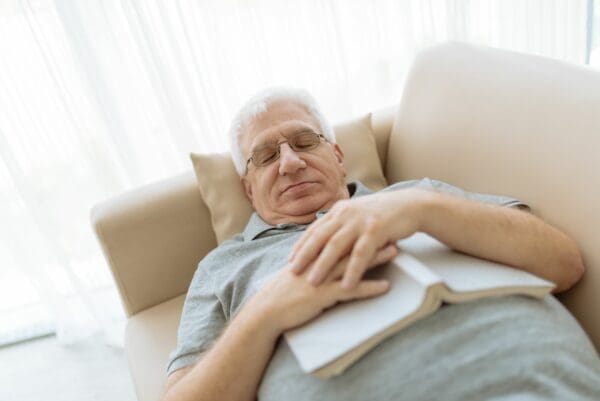Many people find that their sleep changes as they age. Women in particular may find that their transition through menopause causes havoc on their sleep as the change in their hormones causes significant disruptions. Where once they may have slept soundly through the whole night, they now wake repeatedly. Men can also struggle with sleep as they age.
Research tells us that there are various reasons why sleep changes as we age.
If you’ve noticed a significant change in the quality of your sleep over the years, here are five things that may be at the heart of your challenges and what you can do to address them.
1. Circadian rhythm changes
As we age, our circadian rhythm (our sleep cycle) shifts. We may find ourselves tired earlier in the evening, or even the afternoon, and naturally waking up earlier. Or the opposite may occur, and we find we are awake later into the night and needing to sleep in longer. This is called phase advance.
Providing it is possible for you to do so, going with the new rhythm of your body may result in better sleep. Unfortunately, fighting our innate biological rhythm just does not work and this can often be why sleep becomes so disrupted over the years.
2. Sleep architecture changes
There are various stages that govern our sleep and the architecture of our cycle changes as we age. Where once we would have spent more time in our later, deeper stages of sleep, now we spend more time in the lighter, earlier stages. This change in sleep architecture is associated with a lower production of melatonin (our sleep hormone) and growth hormone over the years. Unfortunately, this can lead to more frequent waking.
While there is nothing we can do to prevent these natural changes from occurring in our bodies, we can work on protecting the melatonin we do produce by removing or reducing environmental factors that impact on it. Melatonin is sensitive to blue light, such as is emitted from backlit devices and bright lights, so try to avoid screens and other bright lights for at least two hours before you go to bed. If you find you wake up in the night, avoid scrolling through your phone or other backlit device as this may further reduce your melatonin levels and impact on your ability to get back to sleep. Listening to an audiobook, guided meditation or reading a book with a warm book light are better alternatives.
3. Sleep disorders and other health conditions
It is no secret that as we age, many of us experience age-related changes in our health. The incidence of conditions such as arthritis, heart disease, high blood pressure and diabetes, for example, all increase, many of which can impact on our ability to fall asleep and stay asleep through the night. Medications too can be behind poor sleep.
Sleep apnea is a sleep disorder that increases with age and remains undiagnosed around 80% of the time. It varies in severity and is considered a serious medical condition since it causes sudden drops in blood oxygen levels which can add extra pressure to the cardiovascular system. Men are more at risk of developing sleep apnea than women.
Ensuring that any health conditions are diagnosed and well managed can go a long way to protecting your sleep. If you have noticed a sudden drop in your sleep quality, it is a great idea to chat to your preferred health professional about this to see if there are any health-related reasons causing it and what you can change to improve sleep again.
4. Daytime naps

Research suggests that around 25% of older adults nap at some point during the day. And while napping can be beneficial, many experts advise that long naps, or naps taken later in the day, can create night-time sleep disturbances and make it more challenging to fall asleep at bedtime.
Napping can become part of a vicious catch-up cycle of recovering from a poor night’s sleep. If you do feel that you cannot get through the rest of the day without a nap, try to keep them to the earlier afternoon and cap them at 20 minutes to avoid cutting into your sleep pressure too much. If you need a nap, then your sleep pressure is high but if you nap too long it will take away from your night-time sleep pressure
5. Longer recovery from sudden changes
If you enjoy travelling and regularly move through different time zones, you may find that your recovery time is much longer than it once was. This is related to the alterations in your circadian rhythm and the lowered production of the hormones that help you to sleep.
It is helpful to simply be aware of your propensity to experience jetlag and longer adjustment to daylight savings or time zone switches.
Following the advice in all the above points can help you to transition more smoothly through any sudden changes to your sleep rhythm.
Speak with your doctor if you have persistent problems with your sleep which affect your daytime wellbeing or if you are regularly feeling sleepy during the day. Neither of these are a normal result of ageing and they can be addressed. You should also seek advice if your partner notices changes in your breathing during sleep.
To learn more about aging and sleep, visit the Sleep Health Foundation website.




